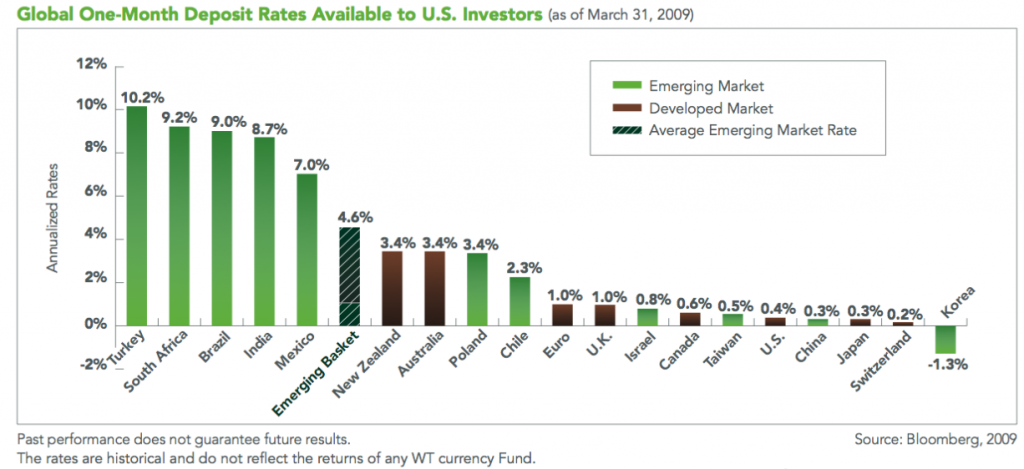On Wednesday, the latest addition the Wisdom Tree family of currency ETFs officially debuted, and in its first two days of trading, the Emerging Currency Fund (CEW) returned an impressive 2.2%. It’s not worth annualizing this figure, but suffice it to say that its performance is already turning heads.
According to the prospectus, CEW “is an actively managed exchange-traded fund that seeks to provide the investor with a liquid, broad-based exposure to money market rates and currency movements within emerging market countries.” Investors will gain exposure both to the currencies themselves and to their respective short-term interest rates, via “short-term U.S. money market securities and forward currency contracts and swaps of the constituent currencies…designed to create a position economically similar to a money market security denominated in each of the selected currencies.”
 Chosen from three regions (Latin America, Africa/Europe/Middle East, and Asia), the inaugural 11 currencies are as follows: Brazilian real, Chinese yuan, Chilean peso, Indian rupee, Israeli shekel, Mexican peso, Polish zloty, South African rand, South Korean won, Taiwanese dollar and Turkish new lira. According to WisdomTree, these currencies were selected not necessarily for economic reasons, but rather because of their relatively high liquidity and low correlation with each other. In addition, “The selected currencies are equally weighted in terms of dollar value at each currency assessment date and after each quarterly re-balancing,” to reflect fluctuations in exchange rates. Naturally, WisdomTree reserves the right to rejigger the portfolio in terms of constituent makeup, but this would probably only be effected to improve overall liquidity, rather to replace an under-performing currency.
Chosen from three regions (Latin America, Africa/Europe/Middle East, and Asia), the inaugural 11 currencies are as follows: Brazilian real, Chinese yuan, Chilean peso, Indian rupee, Israeli shekel, Mexican peso, Polish zloty, South African rand, South Korean won, Taiwanese dollar and Turkish new lira. According to WisdomTree, these currencies were selected not necessarily for economic reasons, but rather because of their relatively high liquidity and low correlation with each other. In addition, “The selected currencies are equally weighted in terms of dollar value at each currency assessment date and after each quarterly re-balancing,” to reflect fluctuations in exchange rates. Naturally, WisdomTree reserves the right to rejigger the portfolio in terms of constituent makeup, but this would probably only be effected to improve overall liquidity, rather to replace an under-performing currency.
The advantage of CEW lies in its automatic diversification, such that investors gain access to a variety of currencies but only have to transact in the fund itself. WisdomTree also points out that, “Emerging market currencies often move independently of domestic stock, bond and money market investments…[and] exhibit low correlations to other alternative asset classes, such as commodities and gold.” The chart below [courtesy ofCEW promotional materials] makes this point indirectly, and it probably comes as a surprise that US stocks are collectively more volatile than individual emerging market currencies. “Incorporating a 10% allocation of emerging currency into balanced portfolio mixes of the domestic stocks and domestic bonds over the last ten years…raised annual returns by an average of 0.66%, while lowering overall portfolio volatility” in a hypothetical exercise.
“In terms of taxation, WisdomTree says normal capital gains rules will apply to the sales of fund shares. However, income from the portion of the fund invested in U.S. money market securities usually will be taxed as ordinary income, while the tax treatment of the local currency forward contracts could vary with the situation.” The fund’s expense ratio, meanwhile, is .55%.
If the preceding paragraphs read like a sales pitch, I apologize, as that was not my intention. At the same time, I’m personally quite positive about CEW (as well as ETFS in general, for that matter), since it provides quick and easy exposure to a bunch of quality currencies, eliminating the need to buy them separately. Not to mention that this fund is debuting right when both the carry trade and emerging markets (and their currencies) are coming back in vogue.
I’m not sure if the timing was deliberate, but it could certainly have been worse. It’s tough to say whether the market rally of the last two months is sustainable, but if the decline in risk aversion that ignited the rally continues to obtain, it will be good for CEW.

0 comments:
Post a Comment